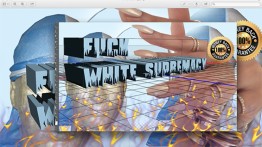CTRL+F "Black"
Tuesday, April 12, 2016, 7 - 9pm

A still from '#CyberNewSlaves,' a work by Tabita Rezaire. Image courtesy Tabita Rezaire
In this free, public lecture, Kimberly Drew will introduce her blog, Black Contemporary Art, and discuss the importance of oral histories, archives, and Facebook groups.
Kimberly Drew (a.k.a. @museummammy) received her B.A. from Smith College in Art History and African-American Studies, with a concentration in Museum Studies. An avid lover of black culture and art, Drew first experienced the art world as an intern in the Director’s Office of The Studio Museum in Harlem. Her time at the Studio Museum inspired her to start the Tumblr blog Black Contemporary Art, sparking her interest in social media.
Since starting her blog, Drew has worked for Hyperallergic, The Studio Museum in Harlem, and Lehmann Maupin. She has delivered lectures and participated in panel discussions at the New Museum of Contemporary Art, the Performa Biennial, The Schomburg Center for Research in Black Culture, Art Basel, the Brooklyn Museum and elsewhere. Drew is currently the Associate Online Community Producer at The Met.
This lecture is part of the Spring 2016 Intradisciplinary Seminar, part of the Robert Lehman Visiting Artist Program at The Cooper Union. We are grateful for major funding support from the Robert Lehman Foundation, Inc.
Located in the Frederick P. Rose Auditorium, at 41 Cooper Square (on Third Avenue between 6th and 7th Streets)




